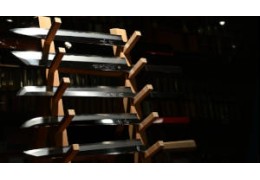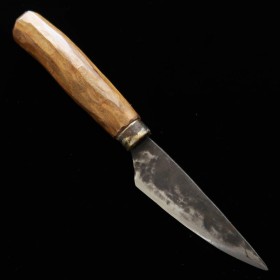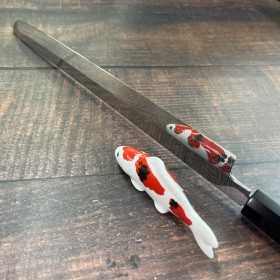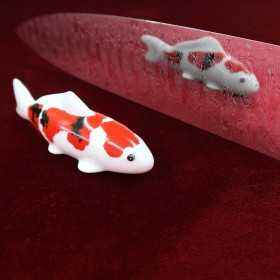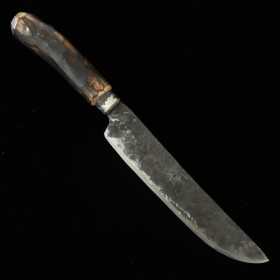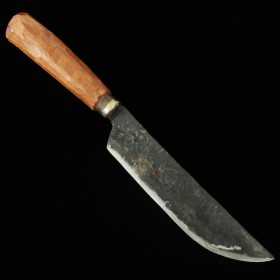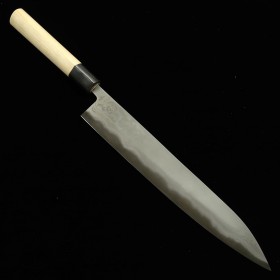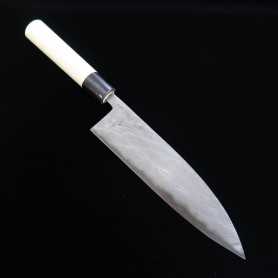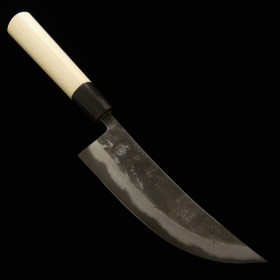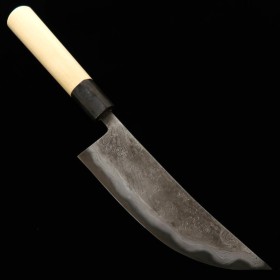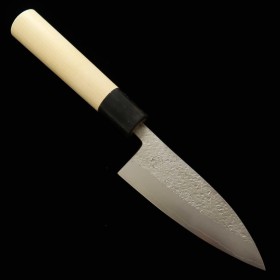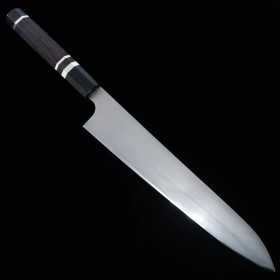japanese knife
There are 47 products.
Japanese Petty Knife - KANIMAN KAJI KOUBOU- Leaf Spring CarbonSteel - Black Finish - Size:10cm
Last items in stock
"Kaniman" is an old Okinawan word meaning “blacksmith” or “one who is involved with iron.” We produce blades that fit modern life based on traditional blades from the southern islands.Steel materials are selected from scrap wood or special steel for blades depending on the blade's purpose, and handles are often made of Okinawan wood.Shima knives - knives that were used in the historical climate of Okinawa, designed to be light and short to fit modern kitchen conditions.
Japanese Petty Knife - KANIMAN KAJI KOUBOU Leaf Spring CarbonSteel - Black Finish - Size:9cm
Last items in stock
"Kaniman" is an old Okinawan word meaning “blacksmith” or “one who is involved with iron.” We produce blades that fit modern life based on traditional blades from the southern islands.Steel materials are selected from scrap wood or special steel for blades depending on the blade's purpose, and handles are often made of Okinawan wood.Shima knives - knives that were used in the historical climate of Okinawa, designed to be light and short to fit modern kitchen conditions.
Japanese Petty Knife - KANIMAN KAJI KOUBOU Leaf Spring CarbonSteel - Black Finish - Size:9cm
Last items in stock
"Kaniman" is an old Okinawan word meaning “blacksmith” or “one who is involved with iron.” We produce blades that fit modern life based on traditional blades from the southern islands.Steel materials are selected from scrap wood or special steel for blades depending on the blade's purpose, and handles are often made of Okinawan wood.Shima knives - knives that were used in the historical climate of Okinawa, designed to be light and short to fit modern kitchen conditions.
Japanese Sakimaru Takohiki Knife - SK JAPAN SHISUI - Stainless Steel Damasteel - Mirrored - Size: 30cm
Last items in stock
Shisui is one of the most talented craftsmen cutlers of the Japan's new generation. Although not so known abroad, Shisui has an unique talent.All your knives are polished as mirror.
¥444,100
Japanese Chef Gyuto Knife - SK Japan SHISUI - Damasteel - Mirrored - Honyaki - Carbon-Fiber Handle - Size: 24cm
Last items in stock
Shisui is one of the most talented craftsmen cutlers of the Japan's new generation. Although not so known abroad, Shisui has an unique talent.All your knives are polished as mirror.
¥297,000
Japanese Santoku Knife - KanimanKajikoubou - ShimaKnife(double-edged blade)-White Carbon Steel No.2 - Black Finish - size:20cm
Last items in stock
"Kaniman" is an old Okinawan word meaning “blacksmith” or “one who is involved with iron.” We produce blades that fit modern life based on traditional blades from the southern islands.Steel materials are selected from scrap wood or special steel for blades depending on the blade's purpose, and handles are often made of Okinawan wood.Shima knives - knives that were used in the historical climate of Okinawa, designed to be light and short to fit modern kitchen conditions.Choose the size:
Japanese Santoku Knife - KanimanKajikoubou - ShimaKnife(double-edged blade)- Carbon White Steel No.2 - Black Finish - size:18cm
Last items in stock
"Kaniman" is an old Okinawan word meaning “blacksmith” or “one who is involved with iron.” We produce blades that fit modern life based on traditional blades from the southern islands.Steel materials are selected from scrap wood or special steel for blades depending on the blade's purpose, and handles are often made of Okinawan wood.Shima knives - knives that were used in the historical climate of Okinawa, designed to be light and short to fit modern kitchen conditions.
Japanese Santoku Knife - KanimanKajiKobo- ShimaKnife(double-edged blade)-White Carbon Steel No.2 - Black Finish - size:20cm
Last items in stock
"Kaniman" is an old Okinawan word meaning “blacksmith” or “one who is involved with iron.” We produce blades that fit modern life based on traditional blades from the southern islands.Steel materials are selected from scrap wood or special steel for blades depending on the blade's purpose, and handles are often made of Okinawan wood.Shima knives - knives that were used in the historical climate of Okinawa, designed to be light and short to fit modern kitchen conditions.
Japanese Sujihiki Knife -Miyazaki Kajiya- Carbon White No2 Soft Iron Clad Damascus -Water quenching– Tsubaki – Size:27cm
Last items in stock
"Miyazaki Kajiya" is located in Goto islands, Nagasaki Prefecture, a city rich in nature, and its knives are made entirely by hand. The craftsman, Haruo Miyazaki, is the third generation of the Oba blacksmith family from Fukuoka Prefecture. He had been trained for five years under Toshio Oba, a master craftsman who forged the traditional "Hakata Ippon Hocho”. He makes knives with the wildness that only a field smith can create, including the Tsubaki knife, which has a unique shape similar to the Hakata knife.
Japanese Chef Gyuto knife - MIYAZAKI KAJIYA - Hryugata - Damascus - Hon warikomi carbon super blue steel 21cm
Last items in stock
"Miyazaki Kajiya" is located in Goto City, Nagasaki Prefecture, a city rich in nature, and its knives are made entirely by hand.
The craftsman, Haruo Miyazaki, is the third generation of the Oba blacksmith family from Fukuoka Prefecture. He had been trained for five years under Toshio Oba, a master craftsman who forged the traditional "Hakata Ippon Hocho”. He makes knives with the wildness that only a field smith can create, including the Tsubaki knife, which has a unique shape similar to the Hakata knife.
The craftsman, Haruo Miyazaki, is the third generation of the Oba blacksmith family from Fukuoka Prefecture. He had been trained for five years under Toshio Oba, a master craftsman who forged the traditional "Hakata Ippon Hocho”. He makes knives with the wildness that only a field smith can create, including the Tsubaki knife, which has a unique shape similar to the Hakata knife.
Japanese BBQ knife Nikukiri - MIYAZAKI KAJIYA - Blue steel No.2 - Damascus - Kurouchi - Size : 18cm
Out-of-Stock
"Miyazaki Kajiya" is located in Goto islands, Nagasaki Prefecture, a city rich in nature, and its knives are made entirely by hand. The craftsman, Haruo Miyazaki, is the third generation of the Oba blacksmith family from Fukuoka Prefecture. He had been trained for five years under Toshio Oba, a master craftsman who forged the traditional "Hakata Ippon Hocho”. He makes knives with the wildness that only a field smith can create, including the Tsubaki knife, which has a unique shape similar to the Hakata knife.
Japanese BBQ knife Nikukiri - MIYAZAKI KAJIYA - White steel No.2 - Damascus - Kurouchi - Size: 18cm
Out-of-Stock
"Miyazaki Kajiya" is located in Goto islands, Nagasaki Prefecture, a city rich in nature, and its knives are made entirely by hand. The craftsman, Haruo Miyazaki, is the third generation of the Oba blacksmith family from Fukuoka Prefecture. He had been trained for five years under Toshio Oba, a master craftsman who forged the traditional "Hakata Ippon Hocho”. He makes knives with the wildness that only a field smith can create, including the Tsubaki knife, which has a unique shape similar to the Hakata knife.
Japanese Petty knife - MIYAZAKI KAJIYA - Stainless Ginsan steel - Hammered - Magnolia wooda handle - Size :
Out-of-Stock
"Miyazaki Kajiya" is located in Goto islands, Nagasaki Prefecture, a city rich in nature, and its knives are made entirely by hand. The craftsman, Haruo Miyazaki, is the third generation of the Oba blacksmith family from Fukuoka Prefecture. He had been trained for five years under Toshio Oba, a master craftsman who forged the traditional "Hakata Ippon Hocho”. He makes knives with the wildness that only a field smith can create, including the Tsubaki knife, which has a unique shape similar to the Hakata knife.
¥21,040
Japanese Chef knife Gyuto - MIYAZAKI KAJIYA - Super Blue Carbon steel - Kurouchi - Magnlolia wood handle - Size : 24/25cm
Out-of-Stock
"Miyazaki Kajiya" is located in Goto islands, Nagasaki Prefecture, a city rich in nature, and its knives are made entirely by hand. The craftsman, Haruo Miyazaki, is the third generation of the Oba blacksmith family from Fukuoka Prefecture. He had been trained for five years under Toshio Oba, a master craftsman who forged the traditional "Hakata Ippon Hocho”. He makes knives with the wildness that only a field smith can create, including the Tsubaki knife, which has a unique shape similar to the Hakata knife.
Japanese Extra Thick Gyuto - MIYAZAKI KAJIYA - White steel NO.2 - Kurouchi Finish - Magnlolia wood handle - Size : 24cm
Out-of-Stock
"Miyazaki Kajiya" is located in Goto islands, Nagasaki Prefecture, a city rich in nature, and its knives are made entirely by hand. The craftsman, Haruo Miyazaki, is the third generation of the Oba blacksmith family from Fukuoka Prefecture. He had been trained for five years under Toshio Oba, a master craftsman who forged the traditional "Hakata Ippon Hocho”. He makes knives with the wildness that only a field smith can create, including the Tsubaki knife, which has a unique shape similar to the Hakata knife.
Japanese Petty Knife - KANIMAN KAJI KOUBOU - Leaf Spring CarbonSteel - Black Finish - Size:9cm
Out-of-Stock
"Kaniman" is an old Okinawan word meaning “blacksmith” or “one who is involved with iron.” We produce blades that fit modern life based on traditional blades from the southern islands.Steel materials are selected from scrap wood or special steel for blades depending on the blade's purpose, and handles are often made of Okinawan wood.Shima knives - knives that were used in the historical climate of Okinawa, designed to be light and short to fit modern kitchen conditions.
Japanese Honyaki Gyuto Knife - RED ORCA - Carbon Blue Steel No.2 - Ebony wood Octagon Handle with Silver Ring - size:24cm
Out-of-Stock
Kofuse-zukuri is a difficult technique that requires a high level of skill and experience, and is the same manufacturing method used for Japanese swords.
The Kofuse-zukuri method was developed in 1995 out of the desire to create something unique, something with the sharpness of forging but with the elasticity of a sword.
Conventional hammered blades are made by inserting steel into steel (steel is sandwiched between steel), but Kofuse-zukuri is the opposite: steel is inserted into steel, in other words, steel is wrapped around extremely soft iron, which serves as the core metal, in the same way as Japanese swords are made.
This highly technical and time-consuming forging process is said to be the reason why Yasugi steel is as resilient as spring steel, strong, and durable (does not chip).
Incidentally, the brand name "Red Orca" was named after Shozo Akitomo, the sales manager of the company, who is fond of orcas.
The Kofuse-zukuri method was developed in 1995 out of the desire to create something unique, something with the sharpness of forging but with the elasticity of a sword.
Conventional hammered blades are made by inserting steel into steel (steel is sandwiched between steel), but Kofuse-zukuri is the opposite: steel is inserted into steel, in other words, steel is wrapped around extremely soft iron, which serves as the core metal, in the same way as Japanese swords are made.
This highly technical and time-consuming forging process is said to be the reason why Yasugi steel is as resilient as spring steel, strong, and durable (does not chip).
Incidentally, the brand name "Red Orca" was named after Shozo Akitomo, the sales manager of the company, who is fond of orcas.

